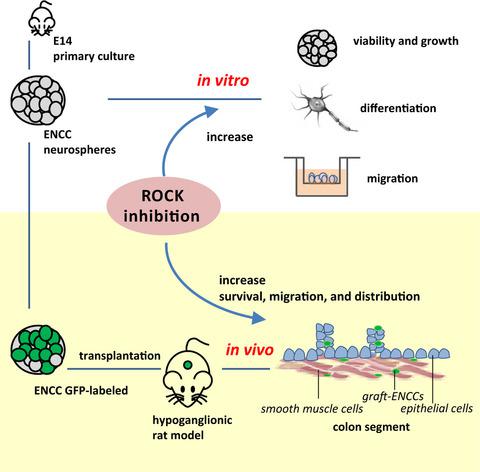当前位置:
X-MOL 学术
›
Neurogastroenterol. Motil.
›
论文详情
Our official English website, www.x-mol.net, welcomes your feedback! (Note: you will need to create a separate account there.)
Inhibition of ROCK signaling pathway accelerates enteric neural crest cell-based therapy after transplantation in a rat hypoganglionic model.
Neurogastroenterology & Motility ( IF 3.5 ) Pub Date : 2020-06-09 , DOI: 10.1111/nmo.13895 Yuying Zhao 1, 2 , Xin Ge 1 , Hui Yu 1 , Laura E Kuil 2 , Maria M Alves 2 , Donghao Tian 1 , Qiang Huang 1 , Xinlin Chen 3 , Robert M W Hofstra 2 , Ya Gao 1
Neurogastroenterology & Motility ( IF 3.5 ) Pub Date : 2020-06-09 , DOI: 10.1111/nmo.13895 Yuying Zhao 1, 2 , Xin Ge 1 , Hui Yu 1 , Laura E Kuil 2 , Maria M Alves 2 , Donghao Tian 1 , Qiang Huang 1 , Xinlin Chen 3 , Robert M W Hofstra 2 , Ya Gao 1
Affiliation

|
Hirschsprung's disease (HSCR) is a congenital gastrointestinal disorder, characterized by enteric ganglia absence in part or entire of the colon, due to abnormal colonization and migration of enteric neural crest cells (ENCCs) during development. Currently, besides surgery which is the main therapy for HSCR, the potential of stem cell‐based transplantation was investigated as an alternative option. Although promising, it has limitations, including poor survival, differentiation, and migration of the grafted cells. We hypothesized that modulation of extracellular factors during transplantation could promote ENCCs proliferation and migration, leading to increased transplantation efficiency. Considering that the RhoA/ROCK pathway is highly involved in cytoskeletal dynamics and neurite growth, our study explored the effect of inhibition of this pathway to improve the success of ENCCs transplantation.
中文翻译:

在大鼠低神经节模型移植后,ROCK信号通路的抑制作用加速了基于肠神经c细胞的治疗。
Hirschsprung病(HSCR)是一种先天性胃肠道疾病,其特征是由于发育过程中肠道神经cells细胞(ENCC)的异常定植和迁移,导致部分或整个结肠的肠道神经节缺失。目前,除了外科手术是HSCR的主要疗法外,还研究了基于干细胞移植的潜力作为替代选择。尽管有希望,但它具有局限性,包括存活率低,分化和移植细胞的迁移。我们假设在移植过程中调节细胞外因子可以促进ENCC的增殖和迁移,从而提高移植效率。考虑到RhoA / ROCK通路高度参与细胞骨架动力学和神经突生长,
更新日期:2020-06-09
中文翻译:

在大鼠低神经节模型移植后,ROCK信号通路的抑制作用加速了基于肠神经c细胞的治疗。
Hirschsprung病(HSCR)是一种先天性胃肠道疾病,其特征是由于发育过程中肠道神经cells细胞(ENCC)的异常定植和迁移,导致部分或整个结肠的肠道神经节缺失。目前,除了外科手术是HSCR的主要疗法外,还研究了基于干细胞移植的潜力作为替代选择。尽管有希望,但它具有局限性,包括存活率低,分化和移植细胞的迁移。我们假设在移植过程中调节细胞外因子可以促进ENCC的增殖和迁移,从而提高移植效率。考虑到RhoA / ROCK通路高度参与细胞骨架动力学和神经突生长,



























 京公网安备 11010802027423号
京公网安备 11010802027423号